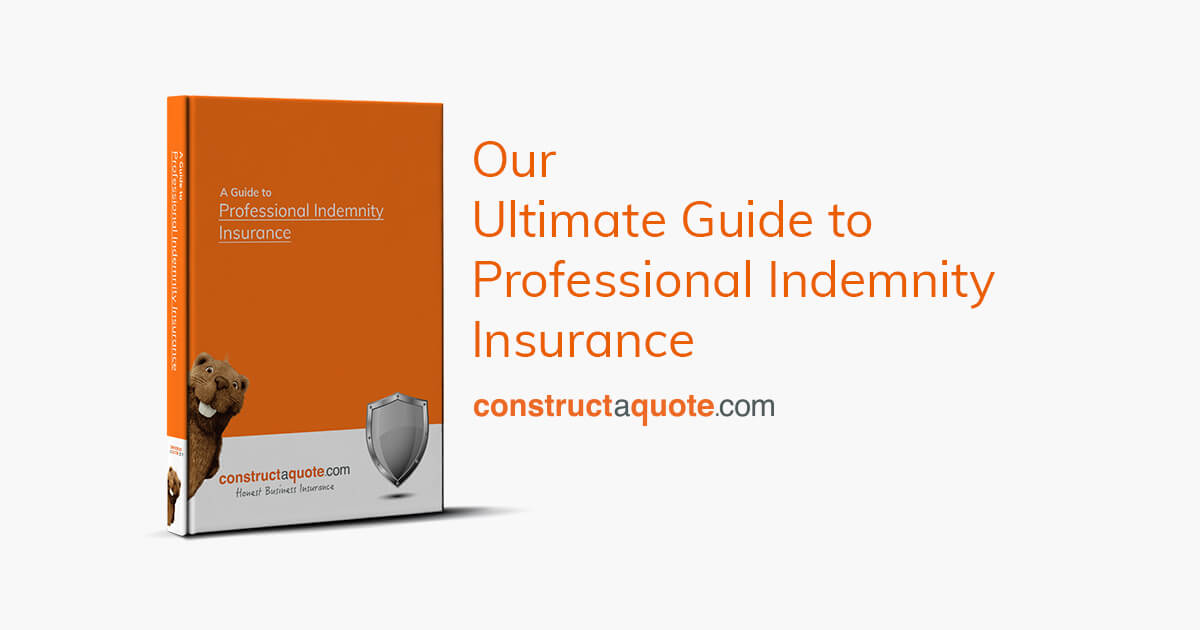by James Watkins - 5 March 2019



Professional indemnity insurance is essential for you as a business professional or consultant as it could protect your business from legal disputes and accusations of negligence made by your clients. By having this insurance, you are protecting your business from potential claims sought from clients – making it worth the additional insurance premium.
Professional indemnity insurance covers legal costs, expenses, and compensation paid to a claimant as a result of a service, which has been proven to be inadequate or negligent in any way, resulting in a financial loss for your client.
The concept of negligence is subjective. Without proper insurance cover, you may not have access to the advice and legal defence you need in the event of an allegation and claim.
Throughout this guide, we will look at all aspects of professional indemnity insurance, including industries where it is recommended. We will also review some example claims to provide a full understanding of this product.

When you take out an insurance policy the hope is that you will never have to use it; however unlike Public and Employers liability insurance whereby the policy is perhaps more beneficial to the claimant, professional indemnity is designed to protect you and your profession.
Professional indemnity insurance protects you and your business if a claim is brought against the business by a client, for reasons relating to a service that has caused them a financial loss.
It also covers your business for intellectual property infringements, claims of dishonesty or defamation, and those relating to loss or inappropriate use of documents or data.
Therefore, if you offer advice or service you could be at risk of a professional indemnity claim.
Professional indemnity insurance is not compulsory for all professions within the United Kingdom. However for some, including accountants it is a mandatory requirement. For those professions that would like to be members of a chartered institute, professional indemnity insurance may not be necessary, or your profession may not be required by law to hold such cover, however it is still imperative that you consider professional indemnity insurance; especially if your business provides professional services that involve advice or guidance, handling data or intellectual property. If you do not have professional indemnity insurance and a claim for negligence is made against you, the financial and reputational repercussions could be devastating to your business.

Some professions which should consider professional indemnity insurance include:
It is important to remember that your professional indemnity insurance is specific to your business type, size and requirements. This ensures that it provides the level of protection that’s needed.
Operating without professional indemnity insurance leaves your business open to claims from third parties. Usually, they will be your clients, but other third parties could also potentially make a claim.
If you work in a professional sector, then professional indemnity insurance can protect you against civil liabilities which include breach of duties, tort, and contract. Your insurance policy can be arranged to cover as many civil liability areas as necessary.
Contractual Liabilities
If you have a contractual relationship with your clients, then this type of professional indemnity insurance is essential. Commercial contracts almost always include a clause which relates to deliverables but also that all duties will be carried out with ‘reasonable care and skill’. When a client makes a claim against you on this basis, they will attempt to prove you have failed to deliver care and skill to a reasonable level.
Tort Liabilities
If you do not have a contractual relationship with your client, but they have a legal case to make, then they may make it under tort law. Torts cover intentional, and accident acts. They usually occur on the basis of a tort of negligence and a tort of defamation. Other types of tort include property (trespass), economic (fraud, conspiracy) and dignitary (invasion of privacy). These liabilities are less likely to apply to professional indemnity insurance claims.
Breach of Duties
Professional indemnity insurance may cover you for breach of statutory duty, breach of intellectual property or breach of fiduciary duty. Cover for breach of statutory duty is particularly important in industries such as accountancy, architecture, quantity surveying or estate agency.
Breach of intellectual property rights can include copyright, trademark, patent, plagiarism and media rights. Finally, fiduciary duty is a legal relationship of confidence and trust between your business and your clients. Breach of fiduciary duty is usually when your client believes you are not acting in their best interests.
These are the core elements of most professional indemnity insurance policies, but it is possible to look at add-ons too. Add-ons may include cover for the loss of documents, fidelity, and libel/slander.
Operating without professional indemnity insurance leaves your business open to claims and, in turn, huge financial risk. The costs of a claim can quickly reach hundreds of thousands and even millions. Most insurers offer policies which provide cover from an indemnity limit of £50,000 as standard. At constructaquote.com we offer limits of indemnity online from £50,000 up to £2 million; however, as a specialist in small business policies if you speak to one of our dedicated insurance agents they are also able to quote above £2million offline.
Facing a claim without insurance is not something many businesses can survive. The combined costs of damages, expenses, and legal defence will have to come from the business’ working capital or savings.
Your professional indemnity insurance can protect you and your business against claims arising from:
• Breach of professional duty
• Negligent misstatement or misrepresentation
• Libel, slander or defamation
• Intellectual property rights infringement
• Breach of confidentiality
• Employee dishonesty
• Accidental transmission of a computer virus
Example Claims
Below are some examples of potential professional indemnity claims:
• A self-employed web designer sued by a client who has been sent a bill by a third party, claiming their copyrighted images were in the client’s web design.
• A professional architect sued by a client because they have had to pay for changes to a building project due to flaws in the architect’s plan.
• A professional IT consultant who offers web hosting as part of their package sued because a cyber-attack meant a client’s website was offline and caused a loss of potential earnings.
• A small marketing company sued because of spelling errors and incorrect information in a flyer that has already been printed and sent out to customers.
These are just some of the potential claims a business could face. Your business is protected by professional indemnity insurance to protect against the specific risks it faces.
There is no exact science for calculating the level of professional indemnity insurance you need. There are no legal requirements and therefore no statutory minimum. Knowing the level of cover needed is complex to work out if you haven’t faced a claim in the past. The experienced specialists at constructaquote.com work hard to find competitively-priced, appropriate insurance at the level of cover requested by the client for their business.
There is no one-size-fits-all solution for professional indemnity insurance. Factors to take into consideration when choosing cover include:
• The size of your business
• The size of the contracts you deal with
• The legal costs you could potentially face
Consider discussing your business position with other professionals, such as those in the legal sector, to ensure you are arranging the right level of cover. You can often extend your cover if you pick up bigger contracts as your business grows. You may arrange a relatively small level of cover initially but check you have the flexibility to extend it as necessary.
When you apply for your professional indemnity insurance cover, there will be some terms which you may not have faced before. You want to ensure you have the best type of cover, and so here we’ll look at some of the key terms of your contract so you can decide the right options for your business or services. Most of the important terms to understand in professional indemnity relate to the limitations of a policy.
Professional Indemnity Insurance Limitations
The limit of indemnity attached to your policy is usually one of two options:
Any One Claim
Any one claim policies mean that the limit you decide for your policy will apply on every occasion there is a claim made. For example, if you have a £2,000,000 limit on your policy then every time you make a claim, it can be up to the value of £2,000,000. Even if several claims occur and relate to the same error or negligent act, your insurer will consider them separately.
Aggregate Cover
Aggregate cover means that the limit of your policy is the limit for all claims, however many are made. Your total cover is the maximum you can be paid out. For example, if you once again have a £1,000,000 limit on your policy then this is the most that can be paid out in total. If you have several claims in a single year, they will stack on top of each other. You could have a claim for £300,000, but then you would only be able to cover a claim of up to £700,000 in the future. Most business owners prefer any one claim policies as they provide a better level of protection for professionals, but they can be more expensive.
“Run Off” Cover provides your company with protection after it has ceased trading. You may not want to think about a day where your business is no longer functioning, but it is practical to consider it may happen as you are still liable for any claims of negligence made, even if it has closed. It is a particularly important consideration for business people nearing retirement.
Professional indemnity insurance is one of the few policies underwritten on a claims-made basis. A “claims made” policy gives you cover for claims made and notified, within the period of insurance. If a negligent act or error happens during the insured period and you inform your insurance company, you can expect to be covered. However, if you choose to cancel or not renew your policy, the cover ends. Even if a claim is made during the period you were insured, you no longer have protection as your policy was cancelled.
This is an important consideration for contractors who move from project to project. You may choose short-term professional indemnity insurance to cover a contract. However, if a claim is made after the contract ends and you have cancelled your policy, you have no protection.
Retroactive Insurance Coverage
When taking out a new policy, many insurers will give you the option of a retroactive date. This covers work completed during the period from said date. For example, if you invest in 12 months’ retroactive cover, you will be protected against claims related to work completed in the last 12 months. The retroactive date chosen will remain active as long as the policy is renewed.
Anybody can theoretically make a claim against you, but it’s most likely to be a client. A claim will usually come about because a client has suffered financial loss or is dissatisfied with your work, there has been a significant mistake, or you haven’t delivered what was agreed.
If a client makes an allegation of negligence or similar against your business, your insurer will want to know about it. Contacting your insurer to discuss the situation helps to ensure they have accurate information, and they can quickly prepare should the allegation progress to a full claim.
When you sign up for any insurance policy, it is your duty to assist your insurer with the information they need to defend claims against you. The sooner you can notify your insurer of a claim, the sooner they can begin collecting evidence and preparing your defence.
The better your record-keeping and the better your quality of your contracts, the better the chance that your insurer can adequately defend and process the claim.
Professional indemnity insurance is a choice, but it is something that all business people should consider seriously. Remember the following points when deciding whether it is a good choice for your business:
• Fully assess your business situation for the level of cover you need. Don’t rely on advice from others, even in the same sector. Every business and the policy it needs is unique.
• Underinsurance can be problematic so make sure you have cover to a level which works for your business.
• Keep good records and have contracts in place. It helps to make sure your insurer can defend your case.
• Check the terms in depth. Make sure you are getting the level of cover and type of policy you want.
• Consider business insurance: some insurers offer a combination policy, incorporating both professional indemnity insurance and public liability insurance.
Working in an area where your advice and experience is integral to your income can be very rewarding. It is a chance to pool your skills and offer an invaluable service in areas that your clients cannot deliver themselves.
There may be dissatisfied clients along the way and unfortunately claims against businesses do happen. Your professional indemnity insurance protects their interests and covers their damages if you are found to be in the wrong. It also protects your interests, your business reputation and the financial health of your business.
constructaquote.com is an insurance broking service dedicated to the UK SME market having developed valued partnerships with the UK’s leading insurers.
constructaquote.com differs to other insurance websites in that we specialise in niche markets including construction, trade and consultants. We bring together the insurance products relevant to you and your business, so that you can arrange all the commercial policies you require in one place.
The products on offer from our partners are varied, ranging from public and employer liability insurance and professional indemnity, to insurance cover for your plant & machinery, van insurance and goods in transit. The simple search facility makes it easy for you to combine any number of policies to meet your insurance requirements.
constructaquote.com can take the worry out of ensuring you have the necessary insurance policies to run your business legally and efficiently.
What do we do?
Using a panel of well-known insurance providers we provide you with instant value-for-money quotations with insurance products created for tradesmen, consultants, landlords and more.You enter your details once and we do the rest. By visiting our dedicated product pages, you can request and choose policies to suit your business, however large or small.
We also support you by providing all the information you need to make an informed decision up front, before you buy. We take the hassle and cost out of ensuring you have the appropriate cover to run your construction business.
How do we do it?
In order to provide you with low cost insurance cover, we don’t charge you; we simply inform you of the quotes on offer from our partners, saving you both time and money. Our insurers pay us commission every time we pass your business onto them, which means we can continue to provide this service, and keep your insurance costs down.
We believe in providing a reliable, transparent service, meaning you can get on with what you do best – managing your business.
We’re not your run-of-the-mill insurance broker; we’re passionate about business and believe honesty is our best policy.
Want to know more? Follow constructaquote.com on Twitter, Facebook and LinkedIn.
What next?
If you require any further information with regards to public liability or employers liability insurance, or any business insurance matter, then please call one of our dedicated agents on 02920 858821 who are on hand to help.
The information provided within this eBook is for general informational purposes only. While we try to keep the information up-to-date and correct, there are no representations or warranties, express or implied, about the completeness, accuracy, reliability, suitability or availability with respect to the information, products, services, or related graphics contained in this eBook for any purpose. Any use of this information is at your own risk.
By downloading this eBook, I acknowledge responsibility and liability for use of its content, and additionally liabilities relating to events that may occur from using its content. I hold constructaquote.com and Moorhouse Insurance Group entirely free from any liability, including financial responsibility for damages incurred, regardless of whether damages are caused by negligence.
By downloading this eBook I forfeit all right to bring a suit against constructaquote.com and Moorhouse Insurance Group for any reason.

by Charlotte Houghton - 7 October 2020
by constructaquote - 6 October 2020
by Charlotte Houghton - 29 September 2020
by Charlotte Houghton - 24 September 2020